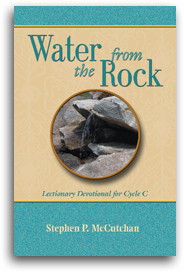Proper 17 / Pentecost 15 / Ordinary Time 22
Devotional
Water From the Rock
Lectionary Devotional for Cycle C
Object:
But my people have changed their glory for something that does not profit.
-- Jeremiah 2:11b
Jeremiah was accusing the people of losing their memory and forgetting the God that had formed them. The people would likely have been confused at his accusation. He was one of their priests, and he would likely have been speaking to them in a religious ceremony. It was the practice of Judaism to engage in what we might call a living memory. They did not think of the escape from Egypt as just an ancient event that happened to their ancestors. Rather, the exodus was a memory both ancient and contemporary. They continually reworked the memory as if it happened to them. It was their continual source of renewal.
Jeremiah believed that there had been a subtle shift in this practice of living memory. Even the priests had failed to detect this subtle shift. The priests did not say, "Where is the Lord...?" The faith had adapted to fit the culture and no longer challenged the culture to remind them of the God who had shaped them. "... The prophets prophesied by Baal, and went after things that do not profit." Baal was a god of fertility. It was a god of personal gain. Were the prophets becoming prophets of success and pragmatic religion and forgetting the God who had led them through bad times and good?
The people, said Jeremiah, have forsaken the "fountain of living waters" and pursued a life of "cracked cisterns that can hold no water." Water was the symbol of the source of life. The fountain of living water was a source of life that came from outside themselves. Israel wanted to be its own source of life. It built cisterns that it could control to gather its own water. But they were cracked cisterns that could not hold on to the very life-giving water that they gathered. This foolish choice had happened because they failed to recite the memory of the true fountain of life. For Christians, our core living memory is given focus in the Last Supper. It is the fountain of living water that God offers to refresh us. Are those who try to draw on the faith, independent of the church, unlike those whom Jeremiah said had tried to substitute cracked cisterns for the fountain of living water? The water is still life-giving, but the well is often shallow and the faith grows stale. It is in the memory rehearsed by the church that we again encounter the fountain of living water.
-- Jeremiah 2:11b
Jeremiah was accusing the people of losing their memory and forgetting the God that had formed them. The people would likely have been confused at his accusation. He was one of their priests, and he would likely have been speaking to them in a religious ceremony. It was the practice of Judaism to engage in what we might call a living memory. They did not think of the escape from Egypt as just an ancient event that happened to their ancestors. Rather, the exodus was a memory both ancient and contemporary. They continually reworked the memory as if it happened to them. It was their continual source of renewal.
Jeremiah believed that there had been a subtle shift in this practice of living memory. Even the priests had failed to detect this subtle shift. The priests did not say, "Where is the Lord...?" The faith had adapted to fit the culture and no longer challenged the culture to remind them of the God who had shaped them. "... The prophets prophesied by Baal, and went after things that do not profit." Baal was a god of fertility. It was a god of personal gain. Were the prophets becoming prophets of success and pragmatic religion and forgetting the God who had led them through bad times and good?
The people, said Jeremiah, have forsaken the "fountain of living waters" and pursued a life of "cracked cisterns that can hold no water." Water was the symbol of the source of life. The fountain of living water was a source of life that came from outside themselves. Israel wanted to be its own source of life. It built cisterns that it could control to gather its own water. But they were cracked cisterns that could not hold on to the very life-giving water that they gathered. This foolish choice had happened because they failed to recite the memory of the true fountain of life. For Christians, our core living memory is given focus in the Last Supper. It is the fountain of living water that God offers to refresh us. Are those who try to draw on the faith, independent of the church, unlike those whom Jeremiah said had tried to substitute cracked cisterns for the fountain of living water? The water is still life-giving, but the well is often shallow and the faith grows stale. It is in the memory rehearsed by the church that we again encounter the fountain of living water.


